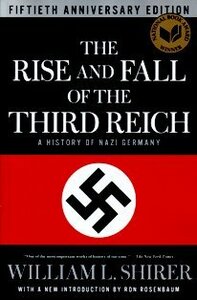Take a photo of a barcode or cover
emotional
informative
reflective
medium-paced
This is one of the most important books that I have ever read. Read this book if you want to have a very good understanding of Adolf Hitler and WWII.
"The power which has always started the greatest religious and political avalanches in history rolling has from time immemorial been the magic power of the spoken word, and that alone.
The broad masses of the people can be moved only by the power of speech. All great movements are popular movements, volcanic eruptions of human passions and emotional sentiments, stirred either by the cruel Goddess of Distress or by the firebrand of the word hurled among the masses; they are not the lemonade-like outpourings of the literary aesthetes and drawing-room-heroes." –Mein Kampf
Shirer’s ability to coalesce so many different sources and events into a cogent, gripping narrative makes this one of the best history books I’ve read. He provides the crucial social/historical context to make sense out of the circumstances that fed the rise of the Nazis and the seeming willingness of the German population. As he lived through this time period while reporting from Germany, his personal experience blends insightfully with the accuracy allowed by hindsight and access to the troves of official documentation and interviews available after the war. While telling the story, he is able to highlight crucial decision points and unique social situations. More impressive, is how effectively he takes advantage of the opportunity to delineate the frequency and degree of lies and misrepresentations the Nazis foisted upon their own people and the international stage (during and after the war). He traces the political developments for nearly a third of the book after outlining the intellectual roots of the Third Reich, which in Hitler’s mind, became a kind of extreme, muddled stew: “… the glorification of war and conquest and the absolute power of the authoritarian state; the belief in the Aryans, or Germans, as the master race, and the hatred of Jews and Slavs; the contempt for democracy and humanism.” The philosophies of thinkers like Treitschke and Hegel fed perfectly into the kind of megalomaniacal vainglory quintessential to the Fuehrer’s ego and ambitions.
For such a large book, it reads extremely well. It took me a long time to finish simply because I kept putting it down to read fiction, but at no point did I find it tedious or boring. Shirer, himself, writing in the afterword, was surprised at how popular the book ended up being. Throughout, one also gets the sense of how fickle history is, made up out of luck/chance, more so than choice and will. The beerhall putsch, military mistakes (the inexplicable German lull that made the evacuation at Dunkirk possible), foresight (Britain’s development of their airforce and radar prior to the war), narrowly avoided assassination attempts, etc. One is left marveling if the entire shape of the 20th century might not have turned out vastly different had Hitler just made it into art school!
Shirer dedicates a whole section to the atrocities of the New Order: the Holocaust (from ghettoes to extermination camps), the ruthless treatment of prisoners, the cold-blooded murder of submissive enemies, and the intent to essentially eliminate or enslave all who were not of the German race. Hitler doesn’t even blink at the thought of millions of Russians starving should his plans succeed. This is a level of such cold inhumanity to be nearly incomprehensible. It may explain, in part, why Allied powers did not react more quickly when the German empire began its expansion. The heartless efficiency with which they went about everything from gassing Jews to plundering conquered cities is nothing short of astounding.
To call my own knowledge of history “lacking” would be generous. Thus, I was caught up time and time again while reading by my own ignorance. Examples abound, but the three biggest were: 1) My complete ignorance of Polish history. As Hitler prepared to invade, I didn’t really understand the extent of his hatred for the Polish. I asked myself what I knew about Poland. Uh, other than it’s location, next to nothing. 2) I never really understood why Japan attacked the U.S. beyond knowing they had aligned themselves with the Germans and were the closest to Pearl Harbor. I knew nothing about the Tripartite Pact, nor about U.S. sanctions in response to Japan’s occupying French Indochina (in short, Germany hoped Japan would help keep the U.S. out of the war, and Japan seems to have used having German and Italian backup as the excuse they needed to buck the U.S.). And, 3) Truly internalizing the shifting boundaries and territories preceding and during WWII is particularly hard from the vantage point of 21st century America. I grew up thinking of countries and their boundaries as pretty stable (this, I will blame on my educational experience and the insulated nature of U.S. news and media).
Eerily, there are quite a few parallels between Nazi Germany and today’s world: totalitarian states like North Korea controlling media and culture exclusively; politicians and leaders exploiting public fears by blaming and ostracizing specific groups of people (gays, immigrants, refugees, Muslims, etc.); appeals to nationalistic and/or racial pride/identity; etc. Even Shirer, writing in 1990 for this 30th anniversary issue of the book questions how much Germany has changed. Granted he was writing before re-unification and the EU, but all this merely underlines the continued significance of international security arrangements like NATO.
For those looking for fiction dealing with WWII, I would highly recommend: The Plot Against America, HHhH, Night, This Way to the Gas Ladies and Gentlemen, and Maus I & II.
--------------------------------------------------------------
WORDS OR PHRASES I HAD TO LOOK UP
abrogation | hakenkreuz | putsch | mountebank | apodictic | praetorian | peroration | Vernichtungslager | quisling | Untermeschen | funicular | gauleiters | Wotan at Valhalla
Brilliant and detailed, probably more detailed than I needed as a casual reader, but I deeply admire the author’s diligence. An important piece of work to help us understand the past, so that can strive for a better present and future.
I've known about this book my whole adult life, but never hunkered down to read it. I thought it was necessary to remind myself how we got here.
William Shirer was an eyewitness journalist who had access to Nazi archives after the Nuremberg trials. I don't know of a more authoritative account. It's a long book, but well worth the effort.
I was surprised to see how many opportunities were missed to stop Hitler. It's sobering to see how close he came to winning. If he'd allowed his Panzer divisions to finish the job at Dunkirk there would not have been a British army left to oppose him. If he hadn't decided that the British were finished and pressed on to occupy Britain there would have been no two-front war. If he hadn't delayed the attack on Russia by four weeks the weather might not have stopped his thrust towards Moscow. If he'd understood the importance of North Africa and the Mediterranean Sea to the British he could have defeated them without risking an invasion.
Authoritarianism is on the march again. Everyone should remember how the Nazis came to power and do what they can to oppose their ideological progeny wherever they spring up.
William Shirer was an eyewitness journalist who had access to Nazi archives after the Nuremberg trials. I don't know of a more authoritative account. It's a long book, but well worth the effort.
I was surprised to see how many opportunities were missed to stop Hitler. It's sobering to see how close he came to winning. If he'd allowed his Panzer divisions to finish the job at Dunkirk there would not have been a British army left to oppose him. If he hadn't decided that the British were finished and pressed on to occupy Britain there would have been no two-front war. If he hadn't delayed the attack on Russia by four weeks the weather might not have stopped his thrust towards Moscow. If he'd understood the importance of North Africa and the Mediterranean Sea to the British he could have defeated them without risking an invasion.
Authoritarianism is on the march again. Everyone should remember how the Nazis came to power and do what they can to oppose their ideological progeny wherever they spring up.
This is the book to read on this terrible part of history as it is happening again.
Reading this entire thing is one of the top accomplishments of my life. I meant to read bits at a time interspersed with other things but it was actually so great I couldn't make myself stop. Fascinating in a million different ways.
A very thorough history of the Third Reich. This is not a history of WWII.
This is a very comprehensive non-academic history of the Third Reich. I found the use of primary sources, include the author's diary, quite compelling. A warning to anyone taking on this book the language used to describe homosexuality was offensive. I understand that the author was a man of his time, so I wouldn't recommend skipping the book because of this, but just wanted to warn others. This book inspired me to learn more about the rise of fascism in particular. I was listening to audio book version, so I sought out an abridged print version with maps and photographs. Definitely necessary for me.
challenging
dark
informative
slow-paced


